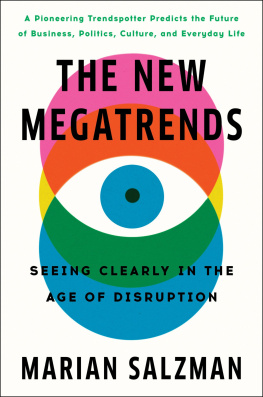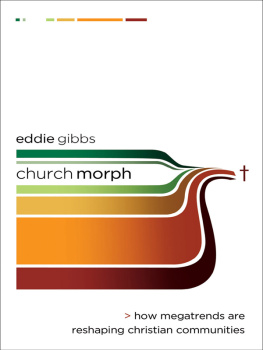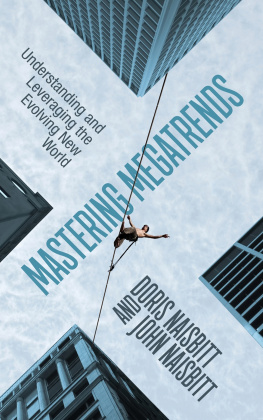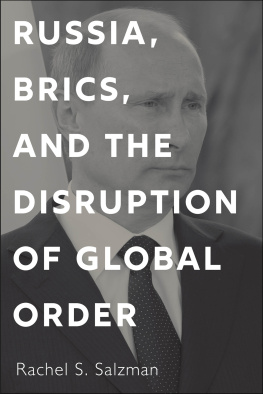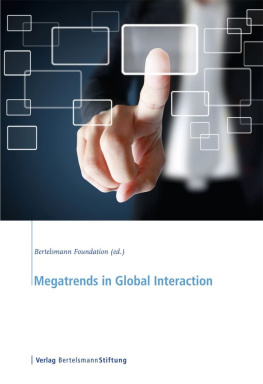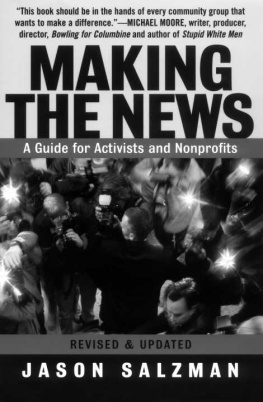Marian Salzman - The New Megatrends: Seeing Clearly in the Age of Disruption
Here you can read online Marian Salzman - The New Megatrends: Seeing Clearly in the Age of Disruption full text of the book (entire story) in english for free. Download pdf and epub, get meaning, cover and reviews about this ebook. year: 2022, publisher: Crown, genre: Politics. Description of the work, (preface) as well as reviews are available. Best literature library LitArk.com created for fans of good reading and offers a wide selection of genres:
Romance novel
Science fiction
Adventure
Detective
Science
History
Home and family
Prose
Art
Politics
Computer
Non-fiction
Religion
Business
Children
Humor
Choose a favorite category and find really read worthwhile books. Enjoy immersion in the world of imagination, feel the emotions of the characters or learn something new for yourself, make an fascinating discovery.
- Book:The New Megatrends: Seeing Clearly in the Age of Disruption
- Author:
- Publisher:Crown
- Genre:
- Year:2022
- Rating:4 / 5
- Favourites:Add to favourites
- Your mark:
- 80
- 1
- 2
- 3
- 4
- 5
The New Megatrends: Seeing Clearly in the Age of Disruption: summary, description and annotation
We offer to read an annotation, description, summary or preface (depends on what the author of the book "The New Megatrends: Seeing Clearly in the Age of Disruption" wrote himself). If you haven't found the necessary information about the book — write in the comments, we will try to find it.
The New Megatrends: Seeing Clearly in the Age of Disruption — read online for free the complete book (whole text) full work
Below is the text of the book, divided by pages. System saving the place of the last page read, allows you to conveniently read the book "The New Megatrends: Seeing Clearly in the Age of Disruption" online for free, without having to search again every time where you left off. Put a bookmark, and you can go to the page where you finished reading at any time.
Font size:
Interval:
Bookmark:
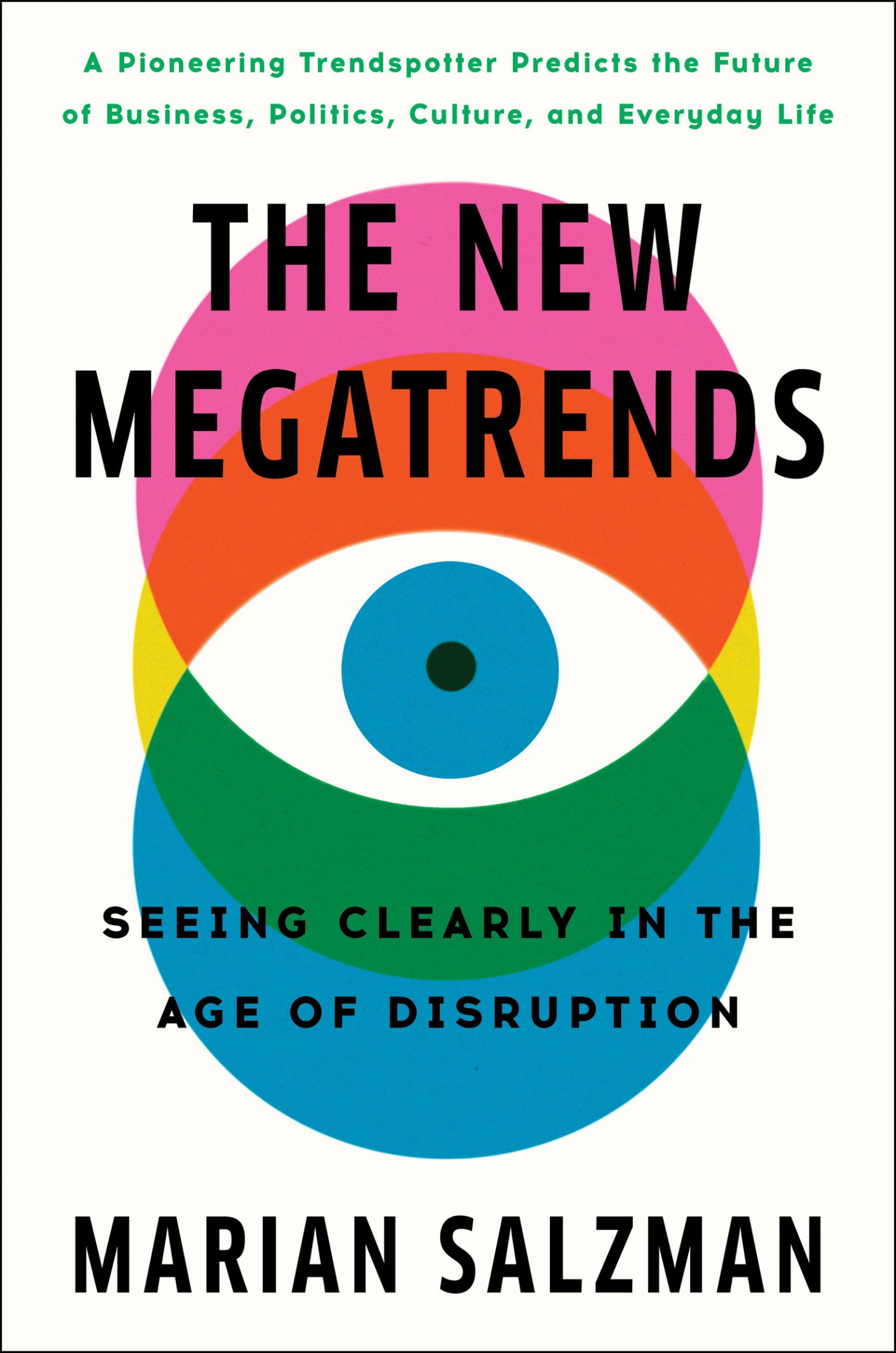
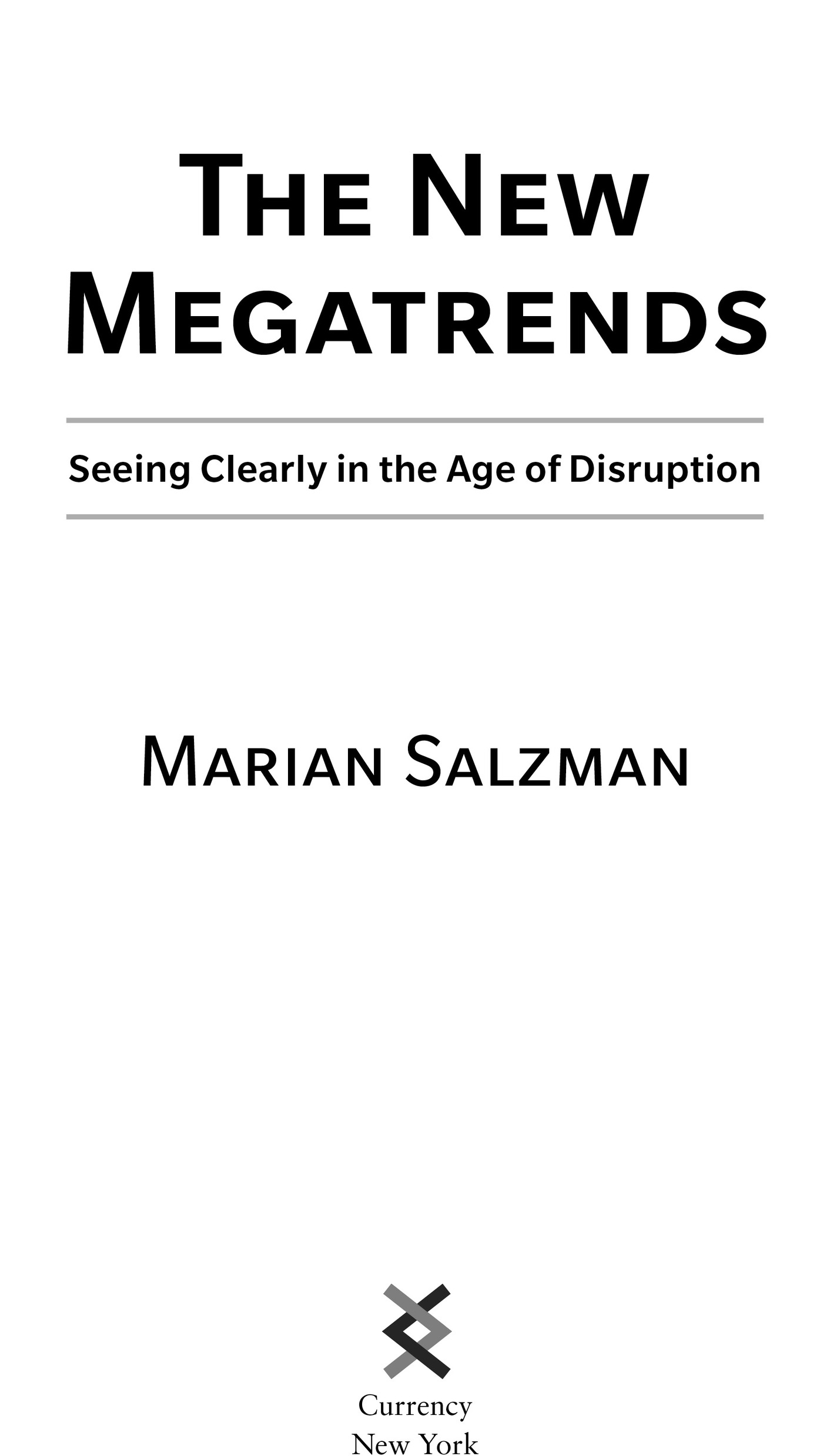
Copyright 2022 by Marian Salzman
All rights reserved.
Published in the United States by Currency, an imprint of Random House, a division of Penguin Random House LLC, New York.
Currency and its colophon are trademarks of Penguin Random House LLC.
Hardback ISBN9780593239704
Ebook ISBN9780593239711
crownpublishing.com
Book design by Virginia Norey, adapted for ebook
Cover design: Lucas Heinrich
Cover illustration: Klaus Vedfelt/Getty
ep_prh_6.0_139875643_c0_r0
You can think of this book as a time travelers guide.
It will take you back twenty years to the turn of the millennium, unpacking the pivotal events in the period of disruption that followed before transporting you forward to two decades after the Great Reset of the present day. With this time span supplying our observational bookends, I will explore how world affairs, technological innovation, social movements, and a pandemic have combined to create trends that are shifting our identities, shaping our collective future, and recasting our past.
Are you keen to understand how the recent past will influence the trends that shape tomorrow? Are you an entrepreneur or a leader looking for an edge by anticipating and responding early to cultural shifts that offer promise or peril? Are you prepared to tackle cold, hard truths today rather than pretending looming catastrophes will magically disappear? If so, this book is for you.
My aim is to help you understand the forces that have led to a world facing widespread dissatisfaction and even the threat of systemic collapse and, crucially, to offer insights into how we might turn things around before it is too late. For reasons I will explain in the introduction, the end point of my forecasts is 2038a timeframe that allows me to make evidence-based predictions without venturing into the murky territory of science fiction.
I refer throughout to cultural trends, business trends, and consumer trends, using them as illustrations and markers to guide you into a global future that will be characterized by unprecedented change and even chaos. These sightings draw on my experiences as a longtime trendspotter, a professional communicator and observer of people, and someone who lives simultaneously on two continents, in three hometowns, and nowhere at all.
Often the word trend carries a superficial connotation, as when it is applied to shifting appetites in entertainment, fashion, and vocabulary. This book will dip into those realms, but they are not its focus. Any serious effort to forecast the future today must necessarily grapple with the weightier issues of climate change, technology use, and polarizationaspects of life that trickle down into every facet of our culture. Forewarned, forearmed; to be prepared is half the victory. Cervantes had it right.
People often ask what it is like to have worked in and around trends for almost four decades. I am reminded that it has been a journey marked by a series of robust immersions and unexpected (sometimes unwelcome) detours. I learned about globalism and deregulation during the Big Banga moment of sudden financial deregulation in the 1980s. I hitchhiked the scantly populated information superhighway in the early 1990s and launched the first market-research company in cyberspace. I lived and worked in the Netherlands when European unification was the next big thing and the polder model, championing consensus decision-making, was coming to the fore. I moved back to New York full-time in 1998 (but kept a base and a team in the Netherlands for a few more years, never completely breaking ties with Holland) and watched the Twin Towers collapse two miles from my loft in September 2001. (When the planes hit, the first person I called after my parents was my executive assistant in Amsterdam; she still recalls my fear and anxiety.) My consumer research into metrosexuality hit a nerve and unleashed a global media explosion. Many years later, I helped promote the launch of Venture for America, whose founder, Andrew Yang, through his unlikely presidential campaign, introduced much of the United States and even some non-Americans to the concept of a universal basic income.
A friend once described me as Forrest Gump lite. In truth, many people have found themselves similarly caught in multiple threads of history in the making. The difference for me is that these threads are not left unexamined. My job as a trends analyst is to untangle and rearrange these strands into a road map that will help us move forward in a reasoned way.
One caveat before you dig in: It is my style to make nonlinear leaps as I lay out possible and probable scenarios and contemplate what has led up to them and how they might develop. Zigs and zags through peaks and valleys reflect the increasingly complex nature of these times. While I always keep a close eye on the United States, a country that has given rise to countless cultural movements in the past fifty years, the predictions contained herein are global in nature. Much of the beauty of trendspotting lies in soaking in the views along the way. But even with some colorful diversions, I promise that I ultimately will deliver you to a destination worth ponderingand a potential future worth fighting for.
Before we journey two decades into the past, I want to spend a few minutes illuminating the methods, history, and implications of my somewhat unusual vocation.
Trendspotting is not about setting trends or influencing cultural movements. As the name would suggest, it is about recognizing and understanding emerging shifts, predicting what will happen next, and then using that foresight to inform actions and gain an advantage, whether personal or professional. For those expecting a sexier explanation, I am sorry to say the practice has nothing to do with divination or mysticism. I dont use tarot cards. I dont drink botanical potions to induce visions. I dont have a special connection to a higher power. As for magic, the sleight of my hand is slight indeed.
And yet I do know a few things about the future.
I look ahead by observing and processing incidents and patterns that may reveal trends, much as sailors study charts and look for signs from the sea and sky. I start by peering into the past to perceive how it has flowed into the present, blending the roles of cultural historian and futurist. The goal is to learn from what has passed to guide us into the best possible version of the future.
You may be thinking, Whats so unique about this? Isnt everyones thinking about the present and the future informed by the past? Unfortunately, no. Too many people measure the present against an idealized vision of the past. Some look to a time when straight white males carried unquestioned authority, when immigrants and minorities knew their place and a womans work was in her husbands home. Others envision a past marked by a closeness to the land and the rhythms of nature, a time of personal responsibility and moral rectitudea past that never truly was, at least not in the way they imagine it. Just because lives were once less technologically turbocharged and slower does not necessarily mean they were simpler, more fulfilling, more equitable, or happier. It is easy to view the good old days through rose-colored glasses, overlooking the frustrations of those times. To get a clear view, the trendspotter must shed these biases before interrogating the past or looking ahead to the future. Only by mining the past with precision can we draw insights untainted by rose, or any other color.
Font size:
Interval:
Bookmark:
Similar books «The New Megatrends: Seeing Clearly in the Age of Disruption»
Look at similar books to The New Megatrends: Seeing Clearly in the Age of Disruption. We have selected literature similar in name and meaning in the hope of providing readers with more options to find new, interesting, not yet read works.
Discussion, reviews of the book The New Megatrends: Seeing Clearly in the Age of Disruption and just readers' own opinions. Leave your comments, write what you think about the work, its meaning or the main characters. Specify what exactly you liked and what you didn't like, and why you think so.

